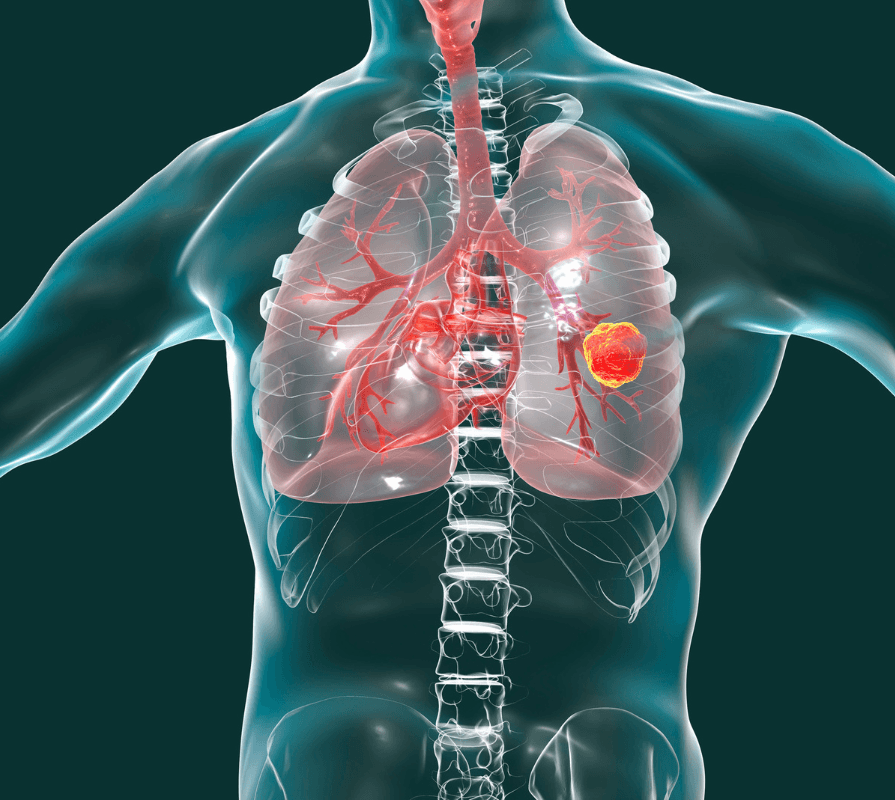Lung Cancer (Non-Small Cell, Small Cell)

Overview
Lung cancer originates in the lungs and is one of the most common and deadly cancers worldwide. It is divided into two main types:
- Non-small cell lung cancer (NSCLC): ~85% of cases; includes adenocarcinoma, squamous cell carcinoma, and large cell carcinoma.
- Small cell lung cancer (SCLC): ~15% of cases; more aggressive and fast-spreading.
Symptoms
- Persistent cough or worsening chronic cough
- Chest pain
- Coughing up blood
- Shortness of breath
- Unexplained weight loss
- Hoarseness
- Fatigue
- Recurrent respiratory infections
Causes & Risk Factors
- Smoking (primary cause of both types)
- Exposure to secondhand smoke
- Radon gas exposure
- Asbestos and air pollutants
- Family history of lung cancer
- Genetic mutations (e.g., EGFR, ALK, KRAS for NSCLC)
Diagnosis
- Chest X-ray and CT scan
- PET scan or MRI (to check for spread)
- Bronchoscopy or needle biopsy
- Molecular testing (NSCLC) to identify mutations for targeted therapy
- Sputum cytology (less common)
Treatment Options
- Surgery (mainly for early-stage NSCLC)
- Radiation therapy
- Chemotherapy
- Targeted therapy (e.g., EGFR, ALK inhibitors)
- Immunotherapy (e.g., PD-1/PD-L1 inhibitors)
- Palliative care for symptom management in advanced cases
Prognosis
- Depends on cancer type, stage, and molecular profile
- NSCLC 5-year survival:
- Localized: ~63%
- Metastatic: ~8%
- SCLC 5-year survival:
- Limited-stage: ~30%
- Extensive-stage: ~3–6%
Living with this Cancer Type
- Smoking cessation support
- Respiratory therapy and oxygen support
- Pain and symptom management
- Psychological support and counseling
- Genetic counseling for families
Prevention & Screening
- Smoking cessation is the most effective prevention
- Annual low-dose CT scan recommended for high-risk individuals (aged 50–80 with a heavy smoking history)
FAQs
Q: Is lung cancer always caused by smoking?
A: No, non-smokers can develop lung cancer due to radon, air pollution, or genetic factors.
Q: Can lung cancer be cured?
A: Early-stage cancers can be cured, but later stages are often managed long-term.
Q: What is the difference between small cell and non-small cell lung cancer?
A: SCLC is more aggressive and fast-growing, while NSCLC is more common and often detected earlier.
Resources
- Global Lung Cancer Coalition
- American Lung Association
- Lung Cancer Foundation of America
- ClinicalTrials.gov
Understand Precision Testing
Learn how liquid biopsy and chemo sensitivity testing can personalize your treatment plan.
Make Informed Decisions
Gain knowledge to actively participate in treatment discussions with your healthcare team.
Improve Treatment Outcomes
Discover how precision medicine and metabolic therapies can enhance treatment effectiveness.
Start Your Educational Journey Today
Empower yourself with knowledge about precision metabolic oncology and take an active role in your cancer care journey.
Need More Information?
Our team of oncology experts is here to help you understand your diagnosis and treatment options.
